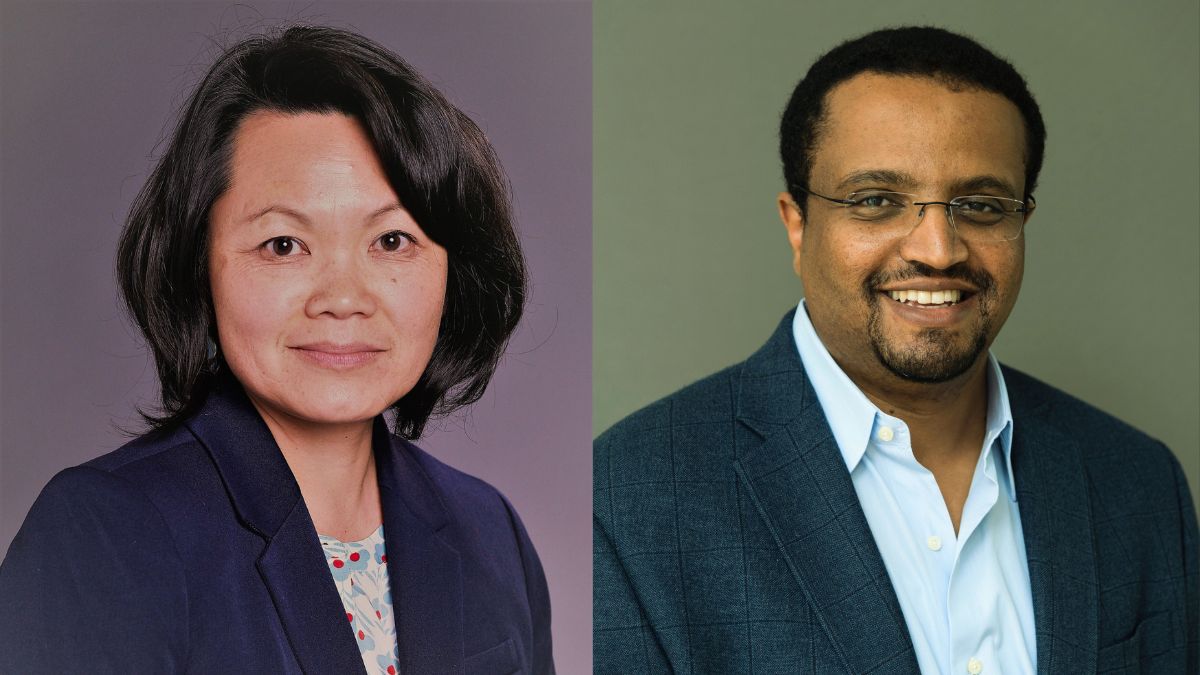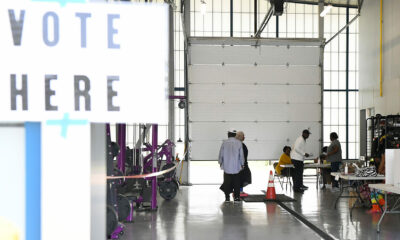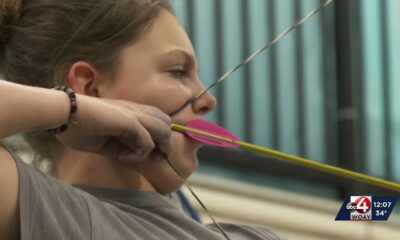Mississippi Today
Q&A: Harvard Chan’s Program Leadership weighs in on improving Mississippi’s public health

Reporter Pam Dankins spoke with Jocelyn Chu, director of the community engaged learning fellowships program at Harvard University, and Bizu Gelaye, program director for the Mississippi Delta Partnership in Public Health program at Harvard University, about the importance of Harvard T.H. Chan School of Public Health initiatives and its efforts to influence positive public health outcomes in the Mississippi Delta.
Through the Mississippi Delta Partnership in Public Health and the Winokur, Jr. Fellowship in Public Health for the Mississippi Delta, Harvard Chan’s faculty, staff and students have partnered with community-based and nonprofit organizations in Mississippi.
Several Harvard Chan students have worked closely in recent years with the Children’s Foundation of Mississippi, where they researched and helped draft a Blueprint for Improving the Future of Mississippi’s Children designed to offer suggestions to policy makers on how to make the biggest impact on the state’s children. Students also worked with Baby University, a free eight-week parenting course for Delta families with children under three years old.
Chu and Gelaye’s work focuses on fellowships that enable Harvard Chan School graduate schools to do field work in the Delta and working with local leaders on public health issues.
This Q&A has been edited for length and clarity.
Pam Dankins: How did Harvard Chan begin to form partnerships between its students and public health organizations in Mississippi?
Bizu Gelaye: I think Dean Williams was featured the last time in a Q&A, where she mentioned the long history that the school has with Mississippi partners. About five years ago, the school leadership decided to have a more comprehensive approach and to engage with collaborators in Mississippi in various forms. So both Jocelyn, myself and another faculty member had an opportunity to travel to Clarksdale to attend the Delta Regional Forum (an assembly aimed at engaging practitioners and scholars to work alongside Delta Region partners and learn about population health from each other).
After we came back, this idea of Mississippi Delta Partnership in Public Health was created, which has three large components, the first one being research collaboration. Not for Harvard faculty members to come and research on topics that interest them, but something that is beneficial, urgent, and priorities for folks in Mississippi and for our faculty members to add value to existing work that’s already happening in the Delta.
The second one is around mentoring and providing opportunities, particularly for pipeline programs. We haven’t had a sustained engagement, so the goal was to try and partner with existing programs. There was the Delta Summer Institute that provides training opportunities to students from around the Delta (to have) firsthand real applied experience of what it means to work with the community, on community engagement and different activities, but public health was not included. We felt this could be a nice opportunity for students from Mississippi to be part of a public health training that also provides them with sustained mentoring throughout their careers. And the last part is providing opportunities for our students who are really engaged in meaningful community-engaged learning activities. So it’s within those three broad opportunities or initiatives that we decided to create this partnership. And this Blueprint (for Improving the Future of Mississippi’s Children) is just one of the components.
Jocelyn Chu: Just to build upon what Bizu mentioned. It is a pretty comprehensive approach that it’s not just for students. It is thinking about engagement of faculty, engagement of students who are undergraduates or/and graduates who are in Mississippi or in the region. The work with the Children’s Foundation started through a conversation with its executive director, Linda Southward. When she was up in Boston back in November of 2019, and it just happened that we were sitting around a table and she talked about her organization and I said, “do you think you’d need any (Harvard public health) students to come alongside and work with you?” We found ourselves in the middle of a pandemic in the summer of 2020, so there were two students that started working with Linda and putting together what she called the first Blueprint for Children’s Health in Mississippi.
Dankins: Chu, you mentioned in a blog on the school’s site about how there’s this need to kind of shift our narratives when we go to different locations in Mississippi. So, what is Harvard Chan’s approach to reduce stigma and discrimination in healthcare settings, especially against marginalized populations?
Chu: That’s a really good question.
I think we’ve been talking a lot about shifting the narrative. After the first time we visited Clarksdale, and then we debriefed, we said there is something in what we experienced and the people that we met. There’s something there that we can learn from and learn more about. Oftentimes, I think in any institution, especially elite institutions, there’s an idea that we go and help or rescue. I want to bring back to school and to campus and into classrooms the idea that we hold a dominant story, a dominant narrative, but it’s an incomplete narrative. It’ll take, what I call proximity or going into the community and immersing ourselves. That’s why our fellowships bring students to a location, and they’re required to stay there for a six to eight week range.
There are many parts to a place. It is knowing and accepting that there is going to be complexity and contradictions that we will find. Now coming back and being in person, we’re hoping to be able to organize a series of conversations at the Chan School by bringing in speakers. We want to also have our students who were in Mississippi over the summer share their work. We have to continue having that exchange and continue to bring rural health and rural health equity into conversation at the school. I think we tread carefully and slowly and make sure that we are working alongside others and coming together as conveners and facilitators of conversations and learning.
Dankins: Right now we are focusing on adults, but how do you take those tools and practices and transfer that knowledge down to younger children in that age range of 0-18?
Gelaye: The more you generate evidence and you try to show that those are effective, I think the more people are going to be able to appreciate and say that okay, this works in this setting. We have to generate evidence but also change how we communicate the evidence. We have to bring the communication in ways where people can understand it, where people live, pray and eat. We have to use the tools of social media that young people are more likely to understand than our outdated means of communication, which is publishing in high-tier academic journals that nobody reads.
Chu: When you mentioned this, Pamela, I was just thinking about the young people that we got to interact with when we went to Clarksdale. I think it is putting the power and determination, sort of self determination, into the hands of young people. I think change is sort of shifting that power over to young people. They determine their future and invest in the communities that they are familiar with or that is their home, and they have the right to say something about it. Those projects that the Delta scholars embark on have lots of great potential, and they want to see change in so many different areas that determine health.
Dankins: Gelaye, what data through your research have you found that emphasizes why studying children, age 0-18 in Mississippi, health is important? Can you state them?
Gelaye: That’s a great question.
I don’t want to say just “children’s health” because I think when we say maternal and child health, the two are related to each other because pre-pregnancy health determines pregnancy outcomes and child health. A child who is born preterm, their long-term health outcomes is predestined, so to speak. It’s pre-programmed. A person who is born too early, which is often one of the biggest problems that we see in many counties in the Delta, which have the highest rates of preterm birth, will develop long-term complications in adulthood, including neurodevelopmental, cardiovascular outcomes, premature mortality, and all the health outcomes one can think of.
There are some incredible organizations that do a great job in Mississippi. One that I have recently learned, and I really appreciate their work, is MomMe. They provide postpartum services and mental health services in Mississippi. I think trying to capitalize on those initiatives supporting mothers better will, in turn, support the children. We have research that comes out of the Center on the Developing Child at Harvard University that the first 1,000 days are really critical for brain and health development of a child. They’re set up for life based on what is provided in those sensitive or critical periods in the first five years. By just looking at one aspect, we may not necessarily be able to appreciate the complexities that exist in the living environment, in the ecosystem that affect both maternal and child health.
Dankins: Are there any future initiatives or research projects in the making to continue Harvard Chan’s efforts in improving public health?
Chu: Hopefully, we’re going to be hosting some conversation seminars in the fall that include our students that were in the field or in Mississippi for the summer and bringing in some speakers. In November, we’re hosting the undergrad Delta scholars (undergraduate students who a committee of community partners and respective academic institutions selects from schools across the US to participate in a summer program of research and projects in Mississippi) that are coming up to Boston which will be another chance to bring the work into the school community.
Gelaye: With research, one is Jackson State University as a lead institution in collaboration with the Mississippi State Department of Health, Harvard and a few other collaborators that are about to get funding from the National Institute of Child Health and Development (NICHD) trying to create a center of excellence for maternal health research. So we’re looking forward to participating in that effort and hopefully engaging students from Mississippi as well as students from Harvard to take part in that.
The other activity that we’re trying to do in the Delta is work with community health centers like the Aaron E. Henry Community Health Center in Coahoma County. Through an initiative called The Right! From the Start (R!FTS) led by Sannie Snell, a social worker and public health advocate who has done great work in neonatal intensive care unit (NICU) babies. Snell is trying to really expand on addressing maternal health by working from the grassroots. The idea is if we can work with the policy and higher level with the Health Department but also with community health centers at the grassroots level, then we’re able to make a difference in addressing the burden of maternal morbidity and mortality.
This article first appeared on Mississippi Today and is republished here under a Creative Commons license.
Mississippi Today
Pharmacy benefit manager reform likely dead
Hotly contested legislation that aimed to increase the transparency and regulation of pharmacy benefit managers appeared dead in the water Tuesday after a lawmaker challenged the bill for a rule violation.
The bill was sent back to conference after Rep. John Hines, D-Greenville, raised a point of order challenging the addition of code sections to the bill, which will likely kill it.
House members in the past have chosen to turn a blind eye to the rule, which would require the added code sections to be removed when the bill is returned to conference. This fatal flaw will make it difficult to revive the legislation.
“It will almost certainly die,” said House Speaker Jason White, who authored the legislation. “And you can celebrate that with your pharmacist when you see them.”
“…This wasn’t ‘gotcha.’ Everybody in this chamber knew that code sections were added, because the attempt was to make 1123 more suitable to all the parties.”
The bill sought to protect patients and independent pharmacists, who have warned that if legislators do not pass a law this year to regulate pharmacy benefit managers, which serve as middlemen in the pharmaceutical industry, some pharmacies may be forced to close. They say that the companies’ low payments and unfair business practices have left them struggling to break even.
The bill underwent several revisions in the House and Senate before reaching its most recent form, which independent pharmacists say has watered the bill down and will not offer them adequate protection.
House Bill 1123, authored by White, originally focused on the transparency of pharmacy benefit managers. The Senate then beefed up the bill by adding provisions barring the companies from steering patients to affiliate pharmacies and prohibiting spread pricing – the practice of paying insurers more for drugs than pharmacists in order to inflate pharmacy benefit managers’ profits.
Independent pharmacists, who have flocked to the Capitol to advocate for reform this session, widely supported the Senate’s version of the bill.
The Senate incorporated several recommendations from the House into its bill, saying that they believed that the legislation would have the House’s support.
Instead, the House sent the bill to conference and requested additional changes, including new language that would eliminate self-funded insurance plans, or health plans in which employers assume the financial risk of covering employees’ health care costs themselves, from a section of the bill that prohibits pharmacy benefit managers from steering patients to specific pharmacies.
This language seeks to satisfy employers, who argue that regulating pharmacy benefit managers’ business practices will lead to higher health insurance costs.
Sen. Rita Parks, R-Corinth, who has spearheaded pharmacy benefit manager reform efforts in the Senate, previously said that adding the language to the bill would “remove any protection out of the law.” But she signed the conference report that included the language Monday after a heated conference meeting between lawmakers.
Rep. Hank Zuber, R-Ocean Springs and co-author of the bill, said the bill has something for everybody, gesturing to its concessions for employers and independent pharmacists. He said the bill gives independent pharmacists 85% of what they wanted.
Mississippi Independent Pharmacies Association director Robert Dozier was not available for comment by the time the story published.
Zuber told House members Tuesday to “blame the Senate” for the slow progress of pharmacy benefit manager reform in Mississippi, citing the body’s failure to take up a drug pricing transparency bill half a decade ago, for three years in a row.
“If the Senate had followed the leadership and the legislation that we drafted those many years ago, we would not be here,” Zuber said. “We would have the information on drug pricing, we would have the information and transparency on (pharmacy benefit managers) and we would have the ultimate reason as to why drug costs continue to rise.”
Members of the House expressed dissatisfaction with the legislation Tuesday, arguing it did not do enough to ensure lower prescription drug costs for consumers.
“I’m going to try to do something next year that goes even further,” Zuber responded.
For the past several years, lawmakers have proposed bills to regulate pharmacy benefit managers, but none have made it as far as this session.
“We’ll go another year,” said White.
This article first appeared on Mississippi Today and is republished here under a Creative Commons license.![]()
Mississippi Today
Feuding GOP lawmakers prepare to leave Jackson without a budget, let governor force them back
After months of bitter Republican political infighting, the Legislature appears likely to end its session Wednesday without passing a $7 billion budget to fund state agencies, potentially threatening a government shutdown if they don’t come back and adopt one by June 30.
After the House adjourned Tuesday night, Speaker Jason White said he had presented the Senate with a final offer to extend the session, which would give the two chambers more time to negotiate a budget. As for now, the 100 or so bills that make up the state budget are dead.
The Senate leadership was expected to meet and consider the offer Tuesday evening, White said. But numerous senators both Republican and Democrat said they would oppose such a parliamentary resolution, and Lt. Gov. Delbert Hosemann has also said it’s unlikely and that the governor will have to force lawmakers back into special session.
White said he believes, if the Senate would agree to extend the session and restart negotiations, lawmakers could pass a budget and end the 2025 session by Sunday, only a few days later than planned.
But if the Senate chooses not to pass a resolution extending the session, White said the House would end the session on Wednesday.
It would take a two-thirds vote of support in both chambers to suspend the rules and extend the session. The Senate opposition appears to be enough to prevent that.
Still, the speaker said he believes Lt. Gov. Delbert Hosemann and Senate leaders are considering the proposal. But he said if he doesn’t hear a positive response by Wednesday, the House will adjourn and wait for Gov. Tate Reeves to call a special session at a later date.
“We are open to (extending the session), but we will not stay here until Sunday waiting around to see if they might do it,” White said.
White said leaving the Capitol without a budget and punting the issue to a special session might not cool tensions between the chambers, as some lawmakers hope.
“I think when you leave here and you end up in a special session, some folks say, ‘Well everybody that’s upset will cool down by then.’ They may, or it may get worse. It may shine a different and specific light on some of the things in this budget and the differences in the House and Senate,” White said. “Whereas, I think everybody now is in the legislative mode, and we might get there.”
The Mississippi Constitution does not grant the governor much power, but if Gov. Tate Reeves calls lawmakers into a special session, he gets to set the specific legislative agenda — not lawmakers.
White said the governor could potentially use his executive authority to direct lawmakers to take up other bills, such as those related to education, before getting to the budget.
“When we leave here without a budget, it is entirely the governor’s prerogative to when he (sets a special session) and how he does that.”
While the future of the state’s budget hangs in the balance, lawmakers have spent the remaining days of their regular session trying to pass the few remaining bills that remained alive on their calendars.
House approves DEI ban, Senate could follow suit on Wednesday
The House on Tuesday passed a proposal to ban diversity, equity and inclusion programs from public schools, and both chambers approved a measure to establish a form of early voting.
The House approved a conference report compromise to ban DEI programs and a list of “divisive concepts” from K-12 schools, community colleges and universities. If the Senate follows suit, Mississippi would join a number of other Republican-controlled states and President Donald Trump, who has made rooting DEI out of the federal government one of his top priorities.
The agreement between the Republican-dominated chambers follows hours of heated debate in which Democrats, all almost of whom are Black, excoriated the legislation as a setback in the long struggle to make Mississippi a fairer place for minorities. Legislative Republicans argued the legislation will elevate merit in education and remove from school settings “divisive concepts” that exacerbate divisions among different identity groups.
The concepts that will be rooted out from curricula include the idea that gender identity can be a “subjective sense of self, disconnected from biological reality.” The move reflects another effort to align with the Trump administration, which has declared via executive order that there are only two sexes.
The House and Senate disagreed on how to enforce the act, but ultimately settled on an agreement that would empower students, faculty members and contractors to sue schools for violating the law, but only after they go through an internal campus review process that would give schools time to make changes. The legislation could also withhold state funds from schools that don’t comply.
Legislature sends ‘early voting lite’ bill to governor
The Legislature also overwhelmingly passed a proposal to establish a watered down version of early voting, though the legislation is titled “in-person excused voting,” and not early voting.
The proposal establishes 22 days of in-person voting before Election Day that requires voters to go to the circuit clerk’s office or another location county officials have designated as a secure early voting facility, such as a courtroom or a board of supervisors meeting room.
To cast an early vote, someone must present a valid form of photo ID and list one of about 15 legal excuses to vote before Election Day. The excuses, however, are broad and would, in theory, allow many people to cast early ballots.
Examples of valid excuses are voters expecting to work on Election Day, being at least 65 years old, being currently enrolled in college or potentially travelling outside of their county on Election Day.
Since most eligible voters either work, go to college or are older than 65 years of age, these excuses would apply to almost everyone.
“Even though this isn’t early voting as we saw originally, it makes this more convenient for hard working Mississippians to go by their clerks’ office and vote in person after showing an ID 22 days prior to an election,” Senate Elections Chairman Jeremy England said.
Republican Gov. Tate Reeves opposes early voting, so it’s unclear if he would sign the measure into law or veto it.
Both chambers are expected to gavel at 10 a.m. on Wednesday to debate the final items on their agenda.
This article first appeared on Mississippi Today and is republished here under a Creative Commons license.
Mississippi Today
‘A lot of us are confused’: Lacking info, some Jacksonians go to wrong polling place
Johnny Byrd knew that when his south Jackson neighborhood Carriage Hills changed wards during redistricting last year, his neighbors would have trouble finding their correct polling place on Election Day.
So he bought a poster board and inscribed it with their new voting location – Christ Tabernacle Church.
“I made a sign and placed it in front of the entrance to our neighborhood that told them exactly where to go so there would be no confusion,” said Byrd, vice president of the Association of South Jackson Neighborhoods.
Still, on April 1, a car full of voters from a senior living facility who should have gone to Christ Tabernacle were driven to their old polling place.
“I thought it was unfortunate they had to get there and find out rather than knowing in advance that their polling location was different,” said Sen. Sollie Norwood, a Democrat from Jackson who was on the ground Tuesday helping constituents with voting.
One of those elderly women became frustrated and said she no longer wanted to vote, Norwood said, though her companions tried to convince her otherwise. By midday Tuesday, 300 people had voted at Christ Tabernacle, one of the city’s largest precincts currently in terms of registered voters, but among the lowest in turnout historically.
Voting rights advocates and candidates vying for municipal office in Jackson are keeping an eye on issues facing voters at the polls, though without official results, it remains to be seen if that will dampen turnout this election with the hotly contested Democratic primary.
“I still believed it was gonna be low,” Monica McInnis, a program manager for the nonprofit OneVoice, said of turnout. “I was expecting it would be a little higher because of what is on the ballot and how many people are running in all of the wards as well as the mayor’s race.”
The situation is evolving as the day goes on, but the main issues are twofold. One, thousands of Jackson voters have new precinct locations after redistricting last year put them into a new city council ward.
Two, some voters didn’t realize their polling place for the municipal elections may differ from where they voted in last year’s national elections, which are run by the counties.
In Mississippi, voters are assigned two precincts that are often but not always the same: A municipal location for city elections and a county location for senate, gubernatorial and presidential elections
“People in Mississippi, we go to the same polling location for three years, and that fourth year, it changes,” said Jada Barnes, an organizer with the Jackson-based nonprofit MS Votes. “A lot of us are confused. When people are going to the polling place today, they’re seeing it is closed, so they’re just going back home which is making turnout go even lower.”
Barnes said she’s hearing this primarily from a few Jackson voters who called a hotline that MS Votes is manning. Lack of awareness around polling locations is a big deterrent, she said, because most people are trying to squeeze their vote in between work, school or family responsibilities.
“Maybe you’re on your lunch break, you only got 30 minutes to go vote, you learn that your polling location has changed and now you have to go back to work,” she said.
Norwood said he heard from a group of students assigned to vote at Christ Tabernacle who had attempted to vote at the wrong precinct and were told their names weren’t on the rolls. They didn’t know they had been moved from Ward 4 to Ward 6, Norwood said, meaning they expected to vote in a different council race until reaching the polls Tuesday.
Though voters have a duty to be informed of their polling location, Barnes said city and circuit clerks and local election commissioners are ultimately responsible for making sure voters know where to go on Election Day.
Angela Harris, the Jackson municipal clerk, said her office worked to inform voters by mailing out thousands of letters to Jacksonians whose precincts changed, including the roughly 6,000 whose wards changed during the 2024 redistricting.
“I am over-swamped,” she said yesterday.
Despite her efforts, at least one voter said he never got a letter. Stephen Brown learned through Facebook, not an official notice, that he was moved from Ward 1 to Ward 2.

A resident of the Briarwood Heights neighborhood in northeast Jackson, Brown’s efforts to vote Tuesday have been complicated by mixed messages and a lack of communication. He has yet to vote, even though he showed up at the polls at 7:10 this morning.
His odyssey took him to two wrong locations, where the poll managers instructed Brown to call his ward’s election commissioner, who did not answer multiple calls, Brown said. Brown finally learned through a Facebook comment that he could look up his new precinct on the Mississippi Secretary of State’s website — if he scrolled down the page past his county precinct information.
This afternoon, Brown has a series of meetings planned, so now he’s hoping for a 30-minute window to try voting one more time, even though he’s skeptical it will make a difference.
“I’m a very disenchanted voter, because I’ve been let down so much,” he said. “I vote because it’s the thing that I’m supposed to do and because of the sacrifices of my ancestors, but not because I truly believe in it, you know?”
Brown’s not alone in facing turbulence. Back at Christ Tabernacle, one Jackson voter, who declined to give her name, said she’s frustrated from having to drive to three polling locations in one day.
“I’m dissatisfied with the fact that I had to drive from one end of this street and all of the back to come over here when I usually vote over here on Highway 18,” she said. “This was a great inconvenience, gas wise and time wise.”
The same thing happened to Rodney Miller. He called the confusion some voters are facing in this election “unnecessary.”
“That ain’t the way we should be handling business,” he said. “We should be looking out for one another better than that, you know? It’s already enough getting people out to vote, and when you confuse them when they try? Come on now. That’s discouraging.”
Christ Tabernacle is the second largest precinct in the city in terms of registered voters, with 3,330 assigned to vote there as of 2024, according to documents retrieved from the municipal election committee. But it had one of the lowest voter turnout rates – 10% in the 2021 primary election before redistricting and before it became so large.
Byrd mentioned the much higher turnout in places like Ward 1 in northeast Jackson, compared to where he lives in south Jackson. Why does Byrd think this is?
“Civics,” Byrd said. “They took civics out of school. If you ask the average person what is the role and responsibility of any elected official, they can’t tell you.”
This article first appeared on Mississippi Today and is republished here under a Creative Commons license.![]()
-

 News from the South - Florida News Feed7 days ago
News from the South - Florida News Feed7 days agoFamily mourns death of 10-year-old Xavier Williams
-

 News from the South - Alabama News Feed5 days ago
News from the South - Alabama News Feed5 days agoSevere storms will impact Alabama this weekend. Damaging winds, hail, and a tornado threat are al…
-

 News from the South - Alabama News Feed5 days ago
News from the South - Alabama News Feed5 days agoUniversity of Alabama student detained by ICE moved to Louisiana
-

 News from the South - Louisiana News Feed6 days ago
News from the South - Louisiana News Feed6 days agoSeafood testers find Shreveport restaurants deceiving customers with foreign shrimp
-

 News from the South - Oklahoma News Feed3 days ago
News from the South - Oklahoma News Feed3 days agoTornado watch, severe thunderstorm warnings issued for Oklahoma
-

 News from the South - Oklahoma News Feed7 days ago
News from the South - Oklahoma News Feed7 days agoWhy are Oklahomans smelling smoke Wednesday morning?
-

 News from the South - West Virginia News Feed6 days ago
News from the South - West Virginia News Feed6 days agoRoane County Schools installing security film on windows to protect students
-

 News from the South - West Virginia News Feed7 days ago
News from the South - West Virginia News Feed7 days agoStudents in Monroe County Schools are ready to shoot their way to the WV State Archery Championships












































